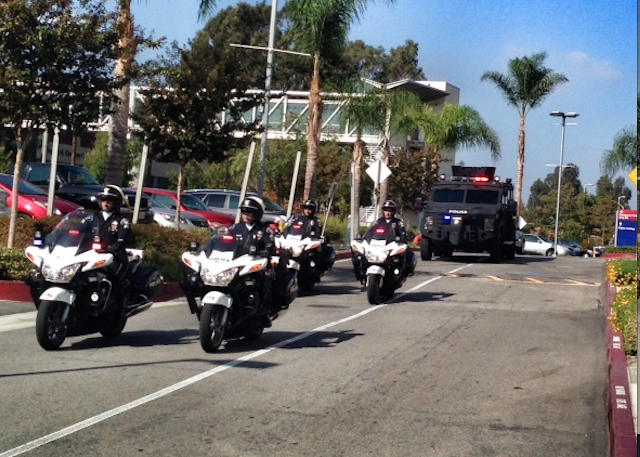Today I watched as the remains of Lt. Ken Alexander were transported from St. Jude Medical Center in Fullerton to McAulay and Wallace Mortuary. It was a solemn procession with representatives from agencies throughout Orange County.
His body was escorted by police cars, motorcycles and fire trucks for several blocks. It was done as a gesture of respect to honor a comrade.
What most of the public doesn’t know, and every police officer does, is that it’s not just bad guys and traffic accidents that kill officers. It’s the job itself.
Most officers in their career will see comrades die from a variety of ailments. I experienced this early on in my Anaheim police career when Officer Rich Harrington passed away at 30 years old. He didn’t show up for work and was found deceased at home. The cause was never fully explained, but we all knew he had been under a great deal of stress from a civil trial he was in the midst of.
After that, Chief Joe Molloy and Chief Randy Gaston both died from heart attacks. By outward appearances, both men were in excellent physical shape. Judi Harmon died of leukemia and Kathy Johnson of breast cancer. Mel Vyborney and Jeffrey Tobin both passed away from brain cancer.
Most recently, Anaheim Police Department Forensic Supervisor Jim Conley passed away this week from a heart attack. He retired after 40 years of service in December of 2013.
My own father was diagnosed with Parkinson’s Disease just before his retirement from the Santa Ana Police Department. He spent most of his sunset years in a wheelchair and bedridden.
Every police officer knows a comrade who died way before their time.
It’s not just a coincidence that so many men and women in law enforcement succumb to heart disease, cancer, high blood pressure and a variety of other aliments.
Dr. John Violanti from the University of Buffalo author of the book “Dying for the Job: Police Work Exposure and Health”, is considered one of the leading experts on the effects of police work on officers, and his findings are disturbing.
According to his research, police officers die significantly earlier than the rest of the general population. Police officers are exposed to environmental hazards such as drug labs, toxic materials and infectious diseases from everyday contacts with people.
This is compounded by shift work and the biggest culprit: stress.
In Dr. Violanti’s research, cortisol stress hormone levels are significantly higher in law enforcement officers than in the general population. It is an occupational risk as dangerous and getting shot at.
In an effort to deal with these findings, academies train recruits on the advantages of lifelong fitness. Many departments have wellness and fitness programs to help officers remain healthy on the job. These are only compensation strategies. They really don’t remove the stressors themselves.
The stress builds and never really goes away.
Five domestic violence calls in one night will wear on anyone. The fourth person of the day angry because they have received a citation they feel they didn’t deserve. The emergency calls that send adrenalin pumping through your body in a matter seconds. And that’s just one patrol shift on a busy day.
Then there’s the ultimate stressor: watching the evening news as the public you are sworn to serve and protect classify the entire profession as a bunch of militarized racist boot-jacketed thugs.
Rest in peace Lt. Alexander. You followed your calling by willingly working to serve and protect others. I hope the people who read this column truly understand the ultimate sacrifice you have made.
 Behind the Badge
Behind the Badge



